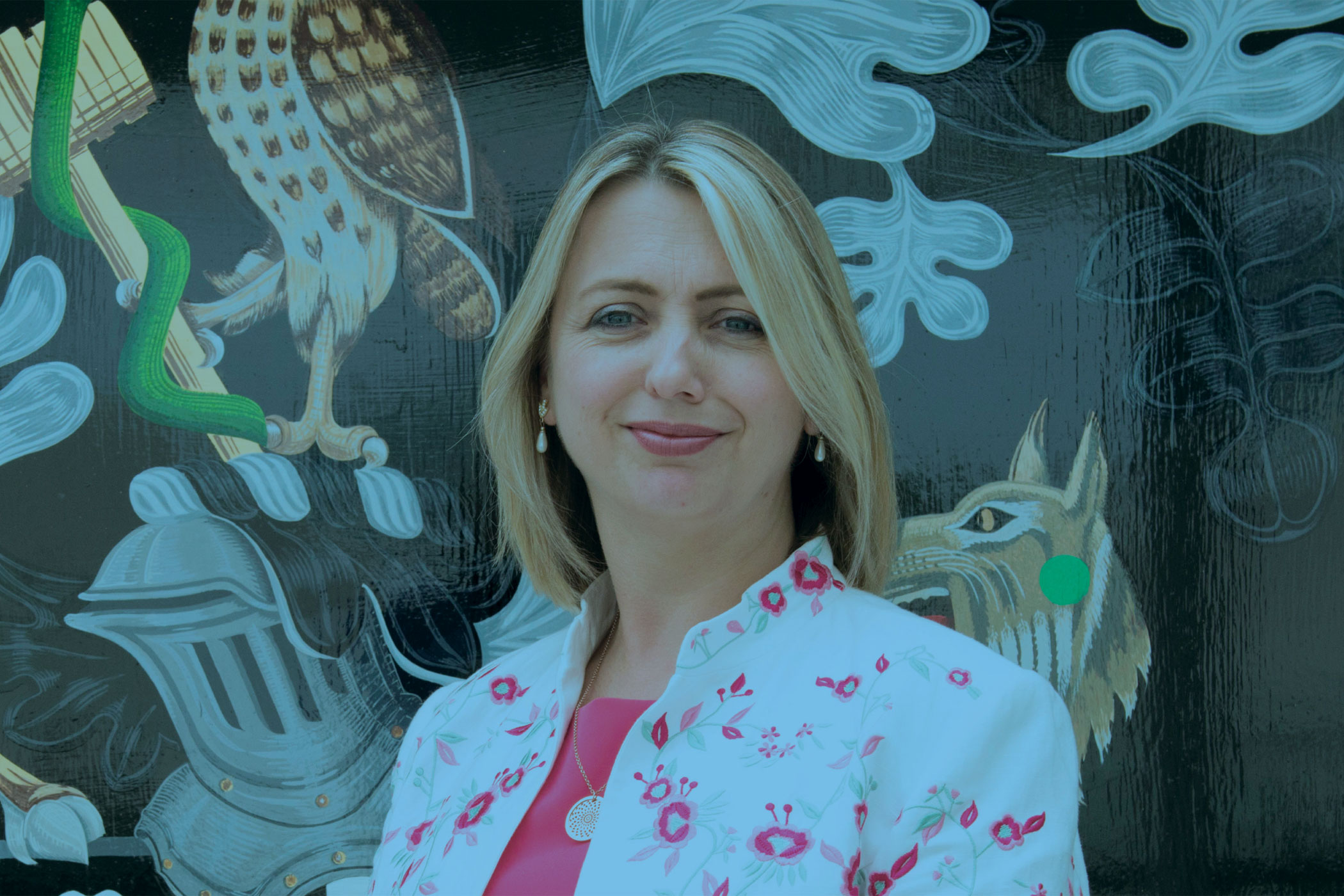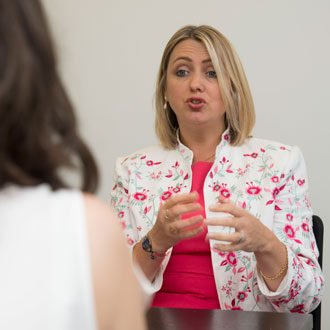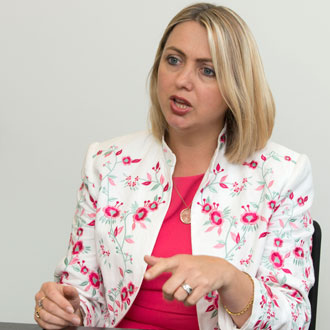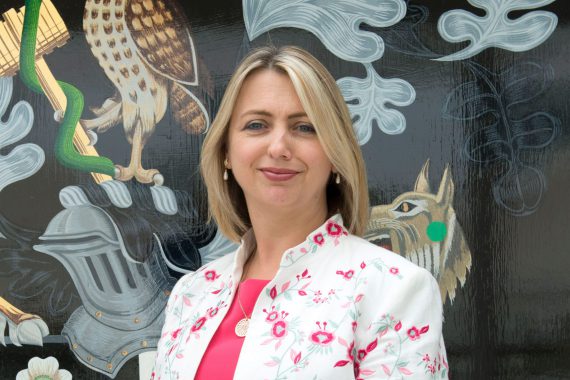
dr helen stokes lampard 3×2 duotone
Within five minutes of being in the same room, you can’t help but warm to Dr Helen Stokes Lampard.
Dressed in bright pink, she bursts into the RCGP office and greets me with an engaging smile, chatting away in her soft Welsh accent (with a hint of Brummie).
The Lichfield GP became RCGP chair-elect in July and although she reminds me she isn’t replacing Dr Maureen Baker until November, she has a visible energy as she begins to talk about the role ahead.
This vibrancy clearly helped win over RCGP council members – but a tougher demeanour is evident behind the smile.
As the college’s treasurer she kicked the RCGP finances into shape after the college moved into its new central London headquarters. This involved a number of redundancies and some controversial changes to charges for trainees.
Nominated for the Power 50 for her ‘inspiring leadership’ and for ‘revitalising the view that general practice is the place to be’, she is also head of academic primary care teaching at the University of Birmingham. Her nominators also pointed out her ‘significant media impact’ this year, speaking out about the need to invest in general practice and defending the profession from attacks, most notably over antibiotic prescribing, on national TV and radio.
But she has major challenges ahead. The college needs to stand by its promise to ensure the Government delivers on the GP Forward View in England and seek similar promises in the devolved nations. It also has work to do on its sometimes distant relationship with grassroots GPs. Dr Stokes-Lampard doesn’t seem fazed – but will her positivity last after she takes over the hot seat?
You’ve said you’ll be ‘fearless for general practice’. How will you do that?

dr helen stokes lampard 330x330px 1
It’s important the chair of the college is someone the profession can trust. We’ve had the most remarkable, fearless chairs in the past few years and I would like to follow in their footsteps by making it quite clear the RCGP is not going to be cowed or bullied into accepting anything less than excellent outcomes for our profession. But you don’t need to be intimidating or aggressive to be fearless.
The college has been accused of not being responsive to grassroots GPs. President Dr Terry Kemple said it has become a ‘complacent corporation’. Do you agree with this?
It was the college that identified the current GP crisis and addressed it. It was the college listening to its members. So ‘complacent’ is harsh. Any organisation can be seen by members as not fulfilling all their needs or wants. We have a long way to go, but actually we’ve done huge amounts to move this agenda forward.
But how do you think you can be more responsive?
As treasurer, I’ve tried to ensure the college is as transparent and as accessible as possible, and we’re working hard on things like improving our website and our communications, recognising our membership is hugely diverse.
One of the things regularly thrown at us officers is ‘you’re not grassroots GPs’. I’m a partner; I do a 14-hour day in my practice. Don’t tell me I don’t know what the reality is. I get frustrated that I can’t provide the service for my patients, and my patients get frustrated that they can’t get to see the doctor they want, or get appointments when they want. We are living in an imperfect world and we are all trying to fight to do our best. We all win if the service is better.
Do you think it was a mistake for the college to say the GP Forward View was ‘the most significant piece of news since the 1960s’ before knowing how it was going to be implemented?
I don’t think there’s any doubt that it is the most significant news since the 1960s. We’re talking £10bn over the next five years. That is a vast sum of money by any measure. But it’s one thing to welcome promises, it’s another to ensure delivery.
The college was very quick to compliment it…
There are over 100 promises in there, and we worked through [them] very carefully. A lot of people who criticised it perhaps hadn’t read it so carefully; they were suggesting a lot of money was being recycled when it wasn’t. It’s natural to be cynical, because we’ve been let down so many times as a profession, but when good news comes we need to celebrate it. It is in all our interests to get this delivered.
What do you plan to do about the recruitment crisis?
For years I’ve worked with trainees to try to enthuse them about the beauty of being the expert generalist. I want to tell the next generation ‘don’t be distracted by the current crisis’ – it will pass. The crisis is very deep and very dark, but I genuinely believe the pendulum is starting to swing back. I’m excited by that.
So you think you will see improvements in your time as chair?
I do believe we will start to see things improve. If we don’t, general practice as we know it won’t exist and the NHS as we know it will be fundamentally shaken.
In England, the first tranches of money have come through and the first help is getting right to the coalface. The indemnity money is a relatively small amount in the great picture of the Forward View, but it’s going to be a lump sum given directly to practices. And it’s only one of many things that need to follow. The promise is that by 2020 all this will be in place. My term of office ends in November 2019… so we will see it.
The GPC is deciding whether to ballot GPs on industrial action. Is that the right move? [NB: interview was conducted before the final decision was made]
The GPC has to act on the decisions and the mandate of the LMCs Conference and it’s really not for me to comment or criticise anybody for that. What I do know is we’ve got a profession full of passionate people and passionate people push hard any way they can to get results. It’s just a reflection of the emotion that people are feeling. I’m keen to channel positive elements of it to get the best outcomes we can. But I hear the negativity, I see the pain people are going through, and I do absorb it. If my outward projection is positive, that’s my personality. But it doesn’t mean I don’t feel the pain.
Professor Clare Gerada wants to see the CSA scrapped. What do you think?

dr helen stokes lampard 330x330px 2
Any assessment needs to be constantly reviewed; we need to check it’s fit for purpose. We know the MRCGP exam is one of the most rigorous professional examinations in the world. However, we should never rest on our laurels – this MRCGP has been running for 10 years now, and the college is already undertaking review of its various elements. [There is] particular scrutiny given this ten-year milestone, but I certainly wouldn’t be suggesting that anything needs to change radically.
But the costs are so high. Is there a way to reduce the burden on trainees?
If you want an exam run by professionals then you have to pay professional costs. That said, we are the only medical royal college that promises to keep our trainee package cost neutral. But it takes a few years for a financial circle to work through, before you can truly say something is cost neutral. The costs of the exams have come down significantly, but trainee membership costs have gone up, because we’ve realised the trainee subs were too little and the exam costs were a bit high. Trainees who started in August 2015 are going to see their exam fees cost significantly less.
back to power50 2016 banner 580x40px
Pulse October survey
Take our July 2025 survey to potentially win £1.000 worth of tokens














